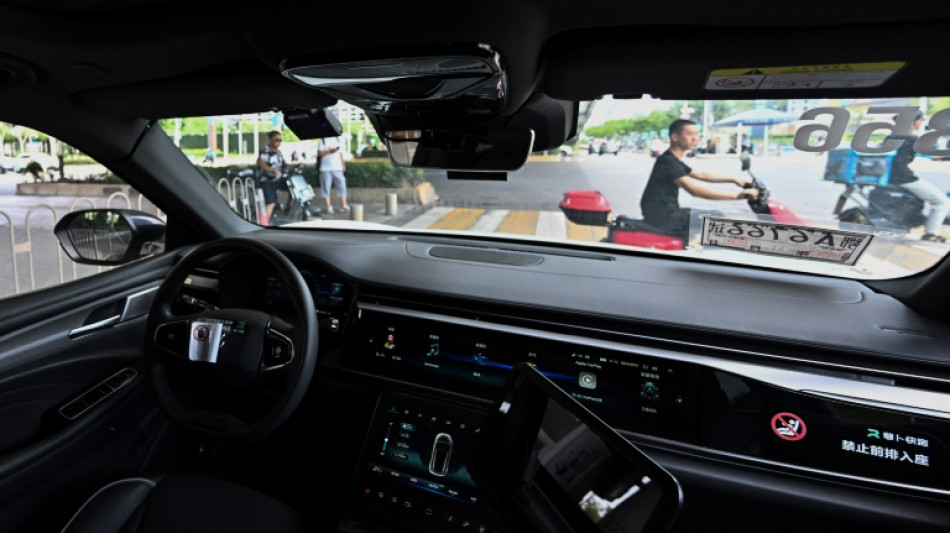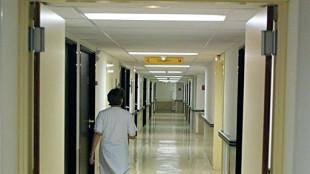
-
 Palestinians welcome ICC arrest warrants for Israeli officials
Palestinians welcome ICC arrest warrants for Israeli officials
-
Senegal ruling party wins parliamentary majority: provisional results

-
 Fiji's Loganimasi in for banned Radradra against Ireland
Fiji's Loganimasi in for banned Radradra against Ireland
-
New proposal awaited in Baku on climate finance deal

-
 Brazil police urge Bolsonaro's indictment for 2022 'coup' plot
Brazil police urge Bolsonaro's indictment for 2022 'coup' plot
-
NFL issues security alert to teams about home burglaries

-
 Common water disinfectant creates potentially toxic byproduct: study
Common water disinfectant creates potentially toxic byproduct: study
-
Chimps are upping their tool game, says study

-
 US actor Smollett's conviction for staged attack overturned
US actor Smollett's conviction for staged attack overturned
-
Fears rise of gender setbacks in global climate battle

-
 'World's best coach' Gatland 'won't leave Wales' - Howley
'World's best coach' Gatland 'won't leave Wales' - Howley
-
Indian PM Modi highlights interest in Guyana's oil

-
 Israel strikes kill 22 in Lebanon as Hezbollah targets south Israel
Israel strikes kill 22 in Lebanon as Hezbollah targets south Israel
-
Argentina lead Davis Cup holders Italy

-
 West Bank city buries three Palestinians killed in Israeli raids
West Bank city buries three Palestinians killed in Israeli raids
-
Fairuz, musical icon of war-torn Lebanon, turns 90

-
 Jones says Scotland need to beat Australia 'to be taken seriously'
Jones says Scotland need to beat Australia 'to be taken seriously'
-
Stock markets push higher but Ukraine tensions urge caution

-
 IMF sees 'limited' impact of floods on Spain GDP growth
IMF sees 'limited' impact of floods on Spain GDP growth
-
Fresh Iran censure looms large over UN nuclear meeting

-
 Volkswagen workers head towards strikes from December
Volkswagen workers head towards strikes from December
-
'More cautious' Dupont covers up in heavy Parisian snow before Argentina Test

-
 UK sanctions Angola's Isabel dos Santos in graft crackdown
UK sanctions Angola's Isabel dos Santos in graft crackdown
-
Sales of existing US homes rise in October

-
 Crunch time: What still needs to be hammered out at COP29?
Crunch time: What still needs to be hammered out at COP29?
-
Minister among 12 held over Serbia station collapse

-
 Spurs boss Postecoglou hails 'outstanding' Bentancur despite Son slur
Spurs boss Postecoglou hails 'outstanding' Bentancur despite Son slur
-
South Sudan rejects 'malicious' report on Kiir family businesses

-
 Kyiv claims 'crazy' Russia fired nuke-capable missile
Kyiv claims 'crazy' Russia fired nuke-capable missile
-
Australia defeat USA to reach Davis Cup semis

-
 Spain holds 1st talks with Palestinian govt since recognising state
Spain holds 1st talks with Palestinian govt since recognising state
-
Stock markets waver as Nvidia, Ukraine tensions urge caution

-
 Returning Vonn targets St Moritz World Cup races
Returning Vonn targets St Moritz World Cup races
-
Ramos nears PSG return as Sampaoli makes Rennes bow

-
 Farrell hands Prendergast first Ireland start for Fiji Test
Farrell hands Prendergast first Ireland start for Fiji Test
-
Gaza strikes kill dozens as ICC issues Netanyahu arrest warrant

-
 Famed Berlin theatre says cuts will sink it
Famed Berlin theatre says cuts will sink it
-
Stuttgart's Undav set to miss rest of year with hamstring injury

-
 Cane, Perenara to make All Blacks farewells against Italy
Cane, Perenara to make All Blacks farewells against Italy
-
Kenya scraps Adani deals as Ruto attempts to reset presidency

-
 French YouTuber takes on manga after conquering Everest
French YouTuber takes on manga after conquering Everest
-
Special reunion in store for France's Flament against 'hot-blooded' Argentina

-
 'World of Warcraft' still going strong as it celebrates 20 years
'World of Warcraft' still going strong as it celebrates 20 years
-
Fritz pulls USA level with Australia in Davis Cup quarters

-
 New Iran censure looms large over UN nuclear meeting
New Iran censure looms large over UN nuclear meeting
-
The first 'zoomed-in' image of a star outside our galaxy

-
 ICC issues arrest warrants for Netanyahu, Gallant, Deif
ICC issues arrest warrants for Netanyahu, Gallant, Deif
-
Minister among 11 held over Serbia station collapse

-
 Historic gold regalia returned to Ghana's king
Historic gold regalia returned to Ghana's king
-
Kyiv accuses Russia of launching intercontinental ballistic missile attack


China's growing 'robotaxi' fleet sparks concern, wonder on streets
Turning heads as they cruise past office buildings and malls, driverless taxis are slowly spreading through Chinese cities, prompting both wariness and wonder.
China's tech companies and automakers have poured billions of dollars into self-driving technology in recent years in an effort to catch industry leaders in the United States.
Now the central city of Wuhan boasts one of the world's largest networks of self-driving cars, home to a fleet of over 500 taxis that can be hailed on an app just like regular rides.
At one intersection in an industrial area of Wuhan, AFP reporters saw at least five robotaxis passing each other as they navigated regular traffic.
"It looks kind of magical, like a sci-fi movie," a local surnamed Yang told AFP.
But not everyone shares Yang's awe.
Debate around safety was sparked in April when a Huawei-backed Aito car was involved in a fatal accident, with the company saying its automatic braking system failed.
A minor collision between a jaywalker and a Wuhan robotaxi last month re-ignited concerns.
Taxi drivers and workers in traditional ride-hailing companies have also raised fears of being replaced by artificial intelligence -- although the technology is far from fully developed.
- Five to 500 -
Wuhan's driverless cabs are part of tech giant Baidu's Apollo Go project, which first received licences to operate in the city in 2022.
Initially only five robocars ferried passengers around 13 square kilometres (five square miles) of the city of around 14 million.
Baidu says the taxis now operate in a 3,000 square kilometre patch -- more than a third of the total land area of Wuhan, including a small part of the city centre.
In comparison, US leader Waymo says the largest area it covers is 816 square kilometres, in Arizona.
When a car reaches its pickup point, riders scan a QR code with their phones to unlock the vehicle -- with the front seats blocked off over safety concerns.
The fares are currently heavily discounted, with a thirty-minute ride taken by AFP costing just 39 yuan ($5.43) compared with 64 yuan in a normal taxi.
"They are stealing our rice bowls, so of course we don't like them," Wuhan taxi driver Deng Haibing told AFP, using a popular Chinese term for livelihoods.
Deng said he fears robotaxi companies will push traditional drivers out of business with subsidised fares, before raising prices once they achieve domination -- similar to the strategy employed by ride-hailing apps in the 2010s.
"Currently the impact isn't too big because robotaxis aren't fully popularised and can't drive everywhere yet," Deng said.
- 'Simply not ready' -
The robotaxi fleet is a tiny fraction of the tens of thousands of taxis and ride-hailing cars in Wuhan.
More and more Chinese cities are rolling out policies to promote self-driving services though, part of a national push for tech supremacy.
Baidu and domestic rival Pony.ai have for years tested models of varying autonomy levels in industrial parks around the country.
Shanghai issued its first batch of provisional permits for fully driverless cars last month, and the capital Beijing has approved fully autonomous robotaxis in suburban areas.
The southwest city of Chongqing and southern tech hub of Shenzhen also have pilot projects underway.
Technology wise, there's still a long way to go before self-driving taxis become ubiquitous though, according to Tom Nunlist, tech policy analyst at Trivium China.
"Everybody seems to think autonomous driving is inevitable at this point, and frankly, I don't know that it is," he told AFP.
"Presently fully autonomous driving tech is simply not ready for large-scale deployment," he said.
Even in Wuhan's Apollo Go taxis -- which can spot obstacles and wait scrupulously at intersections -- ultimate responsibility for safety still lies with human officers monitoring rides remotely.
During one ride in an Apollo Go car, one manipulated the car's built-in touchscreen to remind AFP reporters to put on their seatbelts.
"Safety personnel provide strong assurances for your ride via remote 5G assistance technology," the Apollo Go app tells users.
Robotaxis are also far from able to replicate the human touch.
"Some customers have disabilities and (driverless cars) definitely wouldn't be able to help them, and some passengers are carrying large items," ride-hailing driver Zhao told AFP.
"Only a human can help."
T.Bondarenko--BTB

